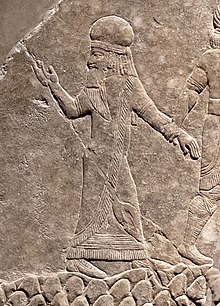Humban-haltash III or Umanaldash was the last major ruler of Elam. He was defeated and captured by the Assyrian king Ashurbanipal.
| Humban Haltash III ("Ummanaldash") | |
|---|---|
| ruler of Elam | |
 Ummanaldash, King of Elam, being arrested by Assyrian troops, circa 645-640 BCE.[1] | |
| Reign | 650 BC – 647 BC[2] |
| Predecessor | Tammaritu II |
| Successor | Ashurbanipal |
| Died | 647 BC Shush, Iran |
| House | Elamite |
Reign
editHe belonged to the Humban-Tahrid, "Neo-Elamite", dynasty (c.830–521 BC). He became king 650 BC.[3] During his kingdom, the Assyrian people attacked Elam and occupied Madektu. This facilitated their way to the Karkheh river. In 647 BC, Susa fell in the Battle of Susa and Ashurbanipal captured Humban Haltash.[4][5] Ashurbanipal wrote:
Susa, the great holy city, abode of their gods, seat of their mysteries, I conquered. I entered its palaces, I opened their treasuries where silver and gold, goods and wealth were amassed... I destroyed the ziggurat of Susa. I smashed its shining copper horns. I reduced the temples of Elam to naught; their gods and goddesses I scattered to the winds. The tombs of their ancient and recent kings I devastated, I exposed to the sun, and I carried away their bones toward the land of Ashur. I devastated the provinces of Elam and on their lands I sowed salt.
— Ashurbanipal[6]
Ashurbanipal's inscriptions and carvings at his palace in Nineveh show a humiliated Humban-haltash being forced to serve food at an Assyrian banquet. It is unclear what happened to Humban-haltash after this.
Gallery
edit-
Ashurbanipal's campaign against Elam is triumphantly recorded in this relief showing the destruction of Hamanu. Here, flames rise from the city as Assyrian soldiers topple it with pickaxes and crowbars and carry off the spoils. British Museum.
-
The capture of Ummanaldash, King of Elam by the Assyrians. 645-640 BCE.[7]
-
Ummanaldash, King of Elam being taken to Nineveh by the Assyrians 645-640 BCE.[8]
-
Humiliation of the Elamite King, forced to serve food at the court of Ashurbanipal. Inscription "...the kings of Elam, whom with the aid of Ashur and Ninlil my hands captured . . . they stood(?), and their own hands prepared their royal meal, and they brought it in before me".[9]
See also
editReferences
edit- ^ "Wall panel; relief British Museum". The British Museum.
- ^ کاظمی, انی (23 May 2009). "سلسله و پادشاهان ایلام باستان - تاریخ ما". تاریخ ما (in Persian). Retrieved 2018-01-18.
- ^ Hamid Sedghinejad, حمید صدقی نژاد. "زیگورات -چغازنبیل". اطلس تاریخ ایران (in Persian). Archived from the original on 2018-01-18. Retrieved 2018-01-18.
- ^ "هومبان هالتاش". Abadis dictionary (in Persian). Retrieved 2018-01-18.
- ^ Matufi, Assadollah (1940). 4000 years history of Iran's military. (in Persian).
- ^ Persians: Masters of Empire" ISBN 0-8094-9104-4 p. 7-8
- ^ "Wall panel; relief British Museum". The British Museum.
- ^ "Wall panel; relief British Museum". The British Museum.
- ^ "Wall panel; relief British Museum". The British Museum.